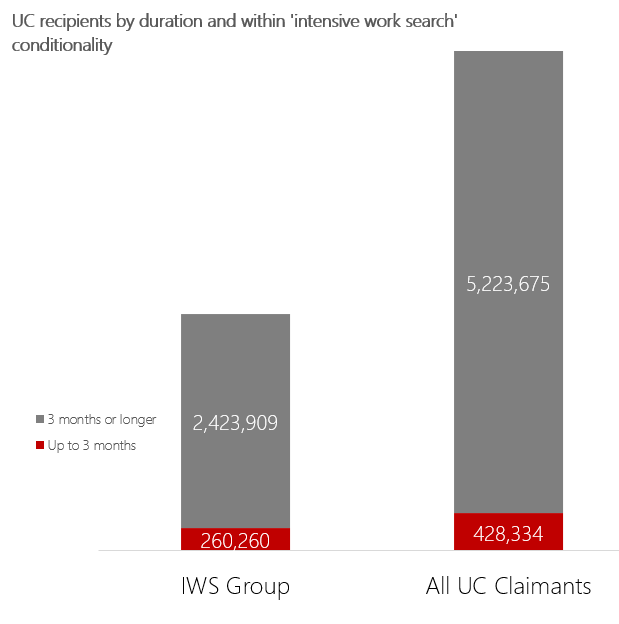Way to Work: Changes to UC rules risk deepening insecurity
Posted on

The Government announced changes to Universal Credit (UC) conditionality today. Under the new rules, branded as the ‘Way to Work’ initiative, claimants will be obliged to broaden their job search criteria to occupations and sectors beyond their previous work experience after four weeks.
Up to now, these requirements have only taken effect after the first three months of an individual’s claim. Individuals subject to these requirements must spend the equivalent of a full-time working week looking for a job, and could face a sanction if they don’t.
When analysing the likely impact of these changes, it is important to recognise the current labour market context. As restrictions have eased and employers across the country have started recruiting again, the vacancy rate has increased to a record high, with 1.25 million jobs unfilled. But labour and skills shortages are driven by a range of complex factors, including sector specific labour supply issues following our departure from the EU, long standing attraction and recruitment challenges in sectors like health and social care.
However, for a range of reasons, ’Way to Work’ is highly unlikely to result in more people moving from welfare into work. Indeed, if anything, it is likely to increase insecurity and instability for many in receipt of Universal Credit.
Firstly, the change in rules announced today is simply not supported by the data. The notion that there are large numbers of UC claimants ready to move in to work is not correct. While forecasts at the onset of the pandemic predicted concerning increases in unemployment, the roll out of the furlough scheme effectively prevented the worst of these scenarios, ensuring that many workers were able to return to their jobs following national lock downs.
Around three quarters of claimants have been on Universal Credit for a year or more. These individuals are already subject to job search requirements, and so the change in approach will not affect them. Just 260,000 claimants have actually been on UC for three months or less (within the IWS group), meaning that the rule changes, and the pledge to ‘get 500,000 people into work’, is simply not feasible within current caseloads.

Source: Work Foundation calculations using DWP Stat-Xplore
In addition, the outdated argument that requiring individuals to apply for jobs can reduce reliance on social security doesn’t relate to our current labour market. In-work poverty is rising, with more than 900,000 people in work currently relying on UC to top up their earnings and help meet essential living costs.
Enforcing stricter UC conditionality risks significant impacts for individuals on low incomes. People often apply for Universal Credit at a point when they’re facing real difficulties in their lives. Eligibility rules mean that they will often have exhausted any savings, and may be building up debts to get by. Applying for jobs and preparing for work is costly and time-intensive, and having to do it while facing the threat of a sanction will increase this pressure.
Our analysis has found that in some cases, the social security system and its approach to conditionality actually makes it harder for people on UC to get the support they need. Individuals subject to requirements can already be prevented from taking up training opportunities that would help them to find secure work, due to the need to fulfil their job search obligations. The changes announced today are only likely to make this more likely in the future.
Ultimately, directing individuals to apply for ‘any job’ without taking account of their aspirations, skills and personal requirements such as caring responsibilities increases the probability that they will quickly fall back out of work. Not only does this approach risk deepening the instability and insecurity of individual claimants, but it also risks damaging perceptions of job centres and the DWP among employers, who could see an increase in tokenistic applications completed to provide evidence to a work coach.
The introduction of Way to Work runs contrary to a wider policy agenda being developed by Government over recent years. The Prime Minister has been clear in his ambition to build a high skill, high pay’ economy, and through pilots such as Skills Bootcamps/Train and Progress, investment in apprenticeships and Kickstart placements, DWP and the Department for Education have been investing in supporting individuals to develop valuable sector-specific skills as they transition in to a new role. The changes announced today risk significantly undermining this agenda.
Moreover, as we’ve outlined through our recent analysis of the latest labour market data , the most pressing concern for Government in supporting a ‘jobs based recovery’ should be stemming the tide of people leaving the labour market altogether. Over the course of the pandemic, the number of people who are economically inactive – that is, neither in work nor looking for work - has risen and remains stubbornly high, at 21.3%.
Addressing this challenge will not be straightforward, and will likely require targeted and personalised support tailored to meet the needs of people who are further away from work, including disabled and older people. Pushing people into applying for any job in any sector, regardless of suitability, is disempowering and counterproductive, and is likely to only serve to increase the insecurity they face.
Related Blogs
Disclaimer
The opinions expressed by our bloggers and those providing comments are personal, and may not necessarily reflect the opinions of Lancaster University. Responsibility for the accuracy of any of the information contained within blog posts belongs to the blogger.
Back to blog listing




